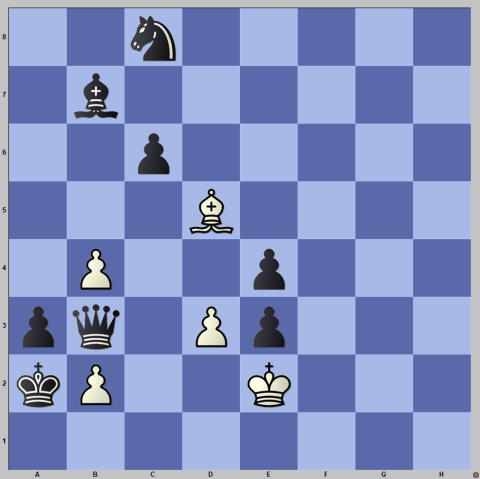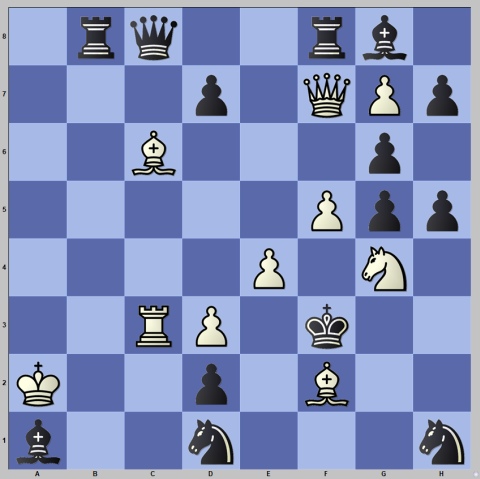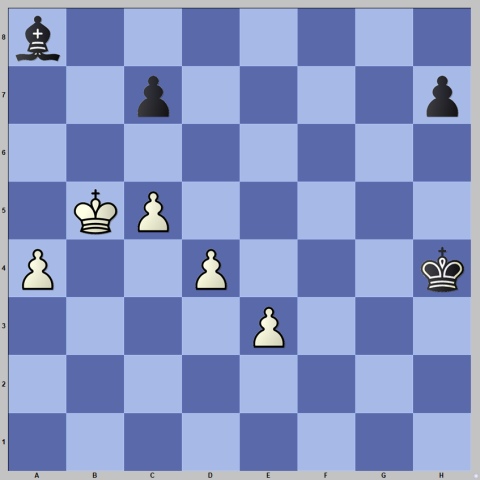Photo: Eddy van Beers (Belgium, bronze), Kacper Piorun (Poland, gold) and Piotr Murdzia (Poland, silver)
The season of the official solving competitions organized by the World Federation for Chess Composition is getting closer to its final and the most important stage: the 46th World Chess Solving Championship in Batumi (September 2-9). The 16th European Chess Solving Championship is in the books, and only four more legs of the World Solving Cup 2022/23 remain.
The European Chess Solving Championship brought together 75 solvers from 18 countries in sunny and friendly Bratislava at the entrance to the Old City. As usual, the ECSC festival included several solving and composing tournaments.
The major event, European Team and Individual Championship, went smoothly, officiated by experienced FIDE Solving Judge Marko Klasinc from Slovenia. Being FIDE Master for Chess Composition and FIDE Solving Master helped him to select a set of 18 solver-friendly compositions of high artistic quality. None of them was too difficult, but all together, they were tough enough to prevent even the best solvers from scoring the maximum of 90 points.
 Waiting for the new set of problems to solve
Waiting for the new set of problems to solve
The problems were spread over six rounds, each including three entries from different genres: 1. twomovers (20 minutes), 2. threemovers (60 minutes), 3. endgames (100 minutes), 4.selfmates (50 minutes), 5. moremovers (80 minutes) and 6. helpmates (50 minutes).
The main favourites, multiple world champions Piotr Murdzia and Kacper Piorun, cruised through the first day with perfect results, the same as the 4th seed Marko Filipović from Croatia. The challenges and tension started mounting on the second day. Filipović lost 5 points on selfmates and gave up third place to Vladimir Podinić from Serbia, who in turn lost all 15 points in the next round of moremovers.
Meanwhile, the Polish duo kept their cool and had perfect results all the way to the final round. Before three helpmates, later easily solved by several solvers (the shortest time was only 23 out of 50 minutes), Murdzia had a slight advantage in time over Piorun (250:259 minutes) and an excellent chance to win.
The last round proved that tension affects even the best of the best. It all came down to the last two problems. The first one was a helpmate in four moves with two intended solutions.
1

Helpmate in 4 moves, 2 solutions
Both leaders found only one solution, each of them missing a different one. Since both spent a maximum of 50 minutes and missed one solution each, it looked as if Murdzia won on time tiebreak, but see what happened with one of his solutions in helpmate in 2 moves:
2

Helpmate in 2 moves, 3 solutions
This complex position, with three different pawn batteries set to open the lines of wB, wR and wQ, hides unusual regrouping of white guns in each solution. Probably, the trickiest solution is 1.Kf4 Rc4 2.Bxg7! e5#
Eight-minute difference decided the tight race between the two favourites in the 2023 Polish Championship, but this time around 9 minutes had no importance as, in a hurry, the 8-time World champion switched the order of two black moves and wrote 1.Bxg7, jumping over the wRc3 on the first move. This rarely-seen blunder (1.5 points) was enough for Kacper Piorun to finally celebrate his first European victory after already having five world champion titles under his belt.
Eddy van Beers from Belgium won the bronze medal and completed the expected domination of the top three seeds.
Kamila Hryshchenko (GBR; below, center), Denisa-Andreea Bucur (ROU; below, left) and Daria Dvoeglazova (ISR; below, right) became the best female solvers (pictured with WFCC President Marjan Kovačević).

With the top two individual scores, the Polish solvers had a massive chance for team victory, but it was not guaranteed since the three best results of four team members count in each round. Piotr Górski, another ex-world champion, was the only team member to have perfect 45 points on the second day, while Jakub Marciniszyn contributed in the 2nd, 3rd and 6th rounds. This lucky combination explains the convincing Polish win with 260 out of possible 270 points: when one of the solvers had a bad round, the other three made up for that!
With their sixth European title, Polish solvers matched the record held by Serbian team, but in the meantime, new contenders for team medals emerged. Lithuanian solvers started their rise in 2018 when Martynas Limontas won the World Solving Cup and kept winning medals in this prestigious competition. Thanks to these impressive results, Lithuanian solvers got strong support on the governmental level, and this year another rising star was born.
Aged under 18, Kevinas Kuznecovas reeled off several victories at the World Solving Cup to become the overall WSC leader after 13 out of 17 WSC legs. Given that his countryman Limontas holds 2nd WSC place, the silver medal for the Lithuanian team was no surprise, but the two WSC leaders wouldn’t have made it alone. Vidmantas Satkus became a hero of the team climbing to the 5th individual place, while Viktoras Paliulionis also contributed in a tense last round.
 Checking solutions after a round
Checking solutions after a round
The bronze medal for the Slovakian team was a great satisfaction for the hosts and their organizing team. Having an average rating much lower than the 4th placed Serbian team, Tomáš Peitl, Richard Dobiáš, Juraj Lörinc and Marek Kolčák leapfrogged the defending champions and put the icing on the cake of their organizing efforts. Once again, the team’s success didn’t come from the sum of individual results but from a lucky match in each round, which usually comes with good team spirit.
In fact, Marek Kolčák and Tomáš Peitl weren’t solving only chess problems in Bratislava. They were among the main members of the ECSC organizing committee, together with Marián Križovenský, Tomáš Peitl, Ľubomír Širáň and Milan Šumný. As mentioned before, ECSC is a massive festival, and this time, the organizers had to take care of not less than four different solving events and two thematic tournaments in composing.
Marek Kolčák, an architect by profession, engaged several members of his artistically inclined family to help surf through the organizing duties. His daughter Nela Kolčák was on registering desk, his brother-in-low Erik Rothenstein was performing a musical program on saxophone during ceremonies, and his mother Běla Kolčáková inspired the official banner with one of her chess paintings from the collection of Nitra Gallery. A well-known artist, Běla Kolčáková, was often inspired by chess motives, and this one she called “Selfmate”:
 Běla Kolčáková: “Selfmate” (from the collection of the Nitra Gallery)
Běla Kolčáková: “Selfmate” (from the collection of the Nitra Gallery)
Among the parallel ECSC events, Bratislava Open was an important leg of the World Solving Cup 2022/23. The field, with most of the ECSC participants, reached the 2nd WSC category (top 10 average rating of 2.558). The winner Piotr Murdzia netted 41 points and came out on top, ahead of Jonathan Mestel and Eddy van Beers. This win placed Murdzia in the top 3 of the WSC 2022/23 Standings, despite taking part in only two out of six possible competitions.
Baltic Combined was another interesting event that united composing and solving skills. Each participant had to compose one original helpmate in 2 moves with a single solution. Next, they solved problems composed by others and got additional points from those who didn’t solve their own composition.
Ulrich Voigt solved all 16 entries and got points from 9 participants who didn’t solve the problem he composed. Vidmantas Satkus had the same sum with 15+10 points, but the longer solving time gave an advantage to Voight (103 minutes). The same tiebreaker favoured Ilija Serafimović, who netted 15+7 points and spent less time than Peter van der Heuvel (15+7).
One of the unlucky composers was the well-known GM Jonathan Mestel, the ex-World Champion in solving and now European champion among seniors (60+). He had perfect solving results, but his helpmate proved to be easier than those of the winners, and his score of 16+4 was enough only for 6th place. If you want to test yourself, you can find all the problems here.
The festival was organized by the Slovak Organization for Chess Composition, and supported by the Slovak Chess Federation. The SCF President Milan Roman and Vice-President Štefan Blaho took part in the opening and closing ceremonies, together with the WFCC President Marjan Kovačević.
After the 16th ECSC, the results of the 45th German Solving Championship didn’t change much on the top of the WSC Standings. It was a 6th WSC Category event, and the most important points (23, 19, and 16) were collected by the domestic solvers Ulrich Voigt, Boris Tummes and Arno Zude.
This tournament was officiated by the busiest FIDE Solving Arbiter Axel Steinbrink, the assistant in both solving events in Bratislava before that. His selections often hide some hard nuts to crack, and this time the hardest one was the next innocently looking endgame:
3

White to play and draw
How to start? The nine best solvers in Gera didn’t get a single point here, stumbling right at the first white move!
There are three more national championships inside the WSC 2022/23, two of them this weekend: in Azerbaijan (June 24-25), and Israel (June 25). The last national championship in 2023 will be held in the Czech Republic (August 26-27).
Whatever happens there, Batumi open (September 4) will be the decisive event, with at least 41 WSC points to grab for the 1st place, or even 46, if the field reaches 1st WCSC Category (top ten average rating over 2.600). The strongest possible field is expected, as the Batumi open comes as an introduction to the 46th World Chess Solving Championship (September 5-6).
Solutions:
1. Marko Klasinc, Original after Tivadar Kardos (version)
A) 1.Qxd5 Kxe3 2.Kb3 Kd2 3.Ka4 Kc3 4.Qb5 b3#;
B) 1.Na7 Bxc6 2.Qxb2+ Kd1 3.Qa1+ Kc2 4.Bc8 Bd5#
2. Dan Meinking 15th Place 5th WCCT 1993-97
A) 1.Ke2 Qc4 2.Rf7 d4#;
B) 1.Kf4 Rc4 2.Bxg7 e5#;
C) 1.Kxg4 Bxd7 2.Qxc3 fxg6#
3. Volker Hergert, Original for Die Schwalbe 2023
1.e4! Bxe4 2.a5! Kg5 3.d5! Bxd5 4.c6! Be4 5.a6 Bd3+ 6.Ka5 Be4 7.Kb5 =
Text: Marjan Kovačević, WFCC President
Photos: Julia Vysotska
Official website: WFCC – World Federation for Chess Composition

